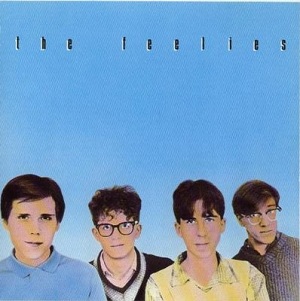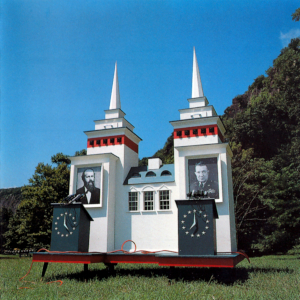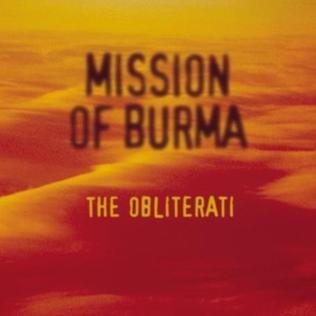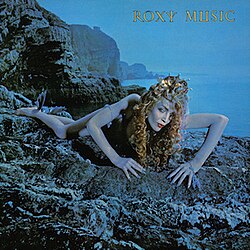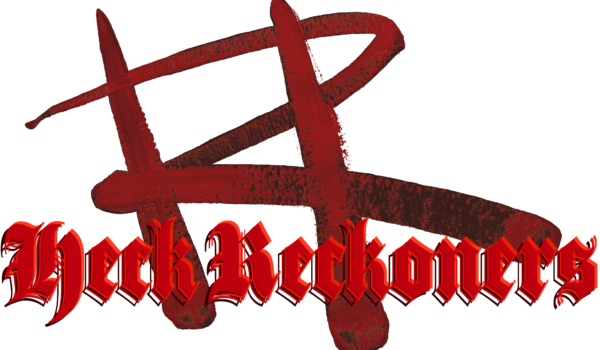You can hear the hands on the strings – pick scrapes, little bends out of tune, blobs of distortion from a mis-struck notes. It’s the sound of pieces of wood and wire being manhandled.
Yank Crimes is one the 1990’s great guitar albums. The corrosive interplay between lead guitarist John Reis and rhythm/vocalist Rick Froberg allows Drive Like Jehu to stretch their post-hardcore songs into seven and nine minute epics.
As someone who fumbles his way through the diminished scales so that not every one of our songs sound like white blues or diatonic pap, I love Jehu’s use of dissonance. Their instruments grind at each other like two sheets of sandpaper. They favor the most dissonance intervals (the b1 and b5 – like yours truly), but prove that even the nastiest sounding notes will eventually sound good together if you play them together long enough.
Like last week’s Heck Record, Spacemen 3’s Perfect Prescription, Yank Crime is a masterclass in repetition. But unlike the Spacemen, Jehu aren’t about drone. They’re about iteration. “Luau” succeeds not because Jehu sits on a single chord for eight of its nine minutes (which they do), it succeeds because they keep finding different ways to express it. At one point the guitars drop out, at another, the dueling guitars become dueling vocals, at yet another, one guitar takes a noisy atonal solo while the other wails unceasingly on that single chord. The track never falters, loping relentlessly in 6/8, until its snare-smacking conclusion. As far as I’m concerned, “Luau” is math rock’s “Freebird.”
Ah, the math rock element. For those hardcore kids who didn’t dive headfirst into grunge or thrash, there was Yank Crimes. In fact, if you need one album of 1990s post-hardcore, spin this disc. It’s like a sampler platter of the era’s best bands. “New Intro” sounds like American Football. “New Math” sounds like Sunny Day Real Estate. “Human Interest” sounds like Unwound. The intro of the multi-part “Sinews” could be a Slint song, before it morphs into something more acid-tongued, like Shellac.
But Jehu was weirder than most post-hardcore bands were at the time. Their songs aren’t only longer, they have weird structures, shifting time signature, and extended patches of silence or high pitched noise (dogs hate the intro to “Super Union – and, you know what, so do I). They also somewhat disappeared.
Jehu released Yank Crimes, their second, in 1994 and then…didn’t really ever break up, but didn’t ever record together again. (FYI: their first album, 1991’s self-titled, is very good, but it’s an earlier draft of everything they perfect on Yank Crimes.) At the time, though, Reis’s more marketable band the more straightforward rock band Rocket From the Crypt probably swallowed up the spotlight (although both bands were signed as a package by Interscope), and Yank Crimes became an afterthought, and, eventually, a cult legend.
Although I enjoy Rocket From The Crypt albums, they’re much more of their time. They were obviously a hot shit live band, and the punk rock plus horns formula is a good one, but they also had more in common with, say, The Mighty Mighty Bosstones than Black Flag, which will probably made them more money throughout their career, but won’t inspire dorks like me to write about them 30 years later.
In the 2000s, Reis and Froberg played together in the garage punk band Hot Snakes, (Reis probably has more bands than pairs of shoes), and Drive Like Jehu reunited and toured the 2010s.
And then Froberg died on an undiagnosed heart condition last year at 55.
Members of At the Drive-In, Botch, Jimmy Eat World, KEN Mode and others – spanning genres from metalcore to noise to emo – cite Jehu as an influence. More should. They’re a great cult band, and Yank Crimes is revered in certain circles, but it deserves a larger audience.
